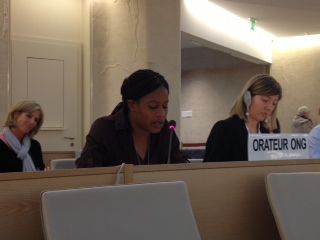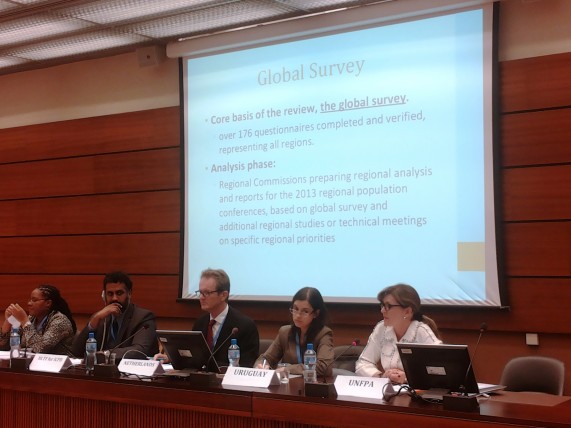Overview of the 23rd Session of the UN Human Rights Council
The 23rd Session of the Human Rights Council ran from May 27 until June 14 2013. Sexual Rights Initiative (SRI) partners participated in the session to ensure that sexual rights issues are included and advanced. SRI partners collectively advocated for the recognition and integration of issues related to sexual and reproductive rights, gender equality and human rights in the resolutions discussed throughout this session.
HRC23 Resolutions:
Accelerating efforts to eliminate all forms of violence against women: preventing and responding to rape and other forms of sexual violence: SRI partners mobilized towards inclusion in this resolution of operational paragraphs on sexual and reproductive rights in the form of critical actions including provision of sexuality education to adolescents, which plays a strong role in promoting gender equality, empowering girls and reducing gender-based violence; and review of laws that criminalize or restrict access to abortion. Unfortunately, due to a lack of political will on behalf of the Canadian government, who tabled it, the final resolution does not contain these actions, or even list critical sexual and reproductive health services that survivors of sexual violence must have access to, such as emergency contraception, safe abortion, post-exposure prophylaxis for HIV, and screening and treatment for sexually transmitted infections as agreed to at this year’s Commission on the Status of Women. The draft resolution did not even recognize the importance of women’s reproductive rights; nonetheless, input from States such as the US, Australia, New Zealand, and a number of European, Latin American and Caribbean States led to inclusion of language recognizing the importance of promoting sexual and reproductive health (SRH) and protecting and fulfilling reproductive rights. The final resolution does have a strong provision on marital rape and changing discriminatory laws in relation to sexual violence. It was co-sponsored by 66 member states (a drop in number from previous years).
Access to medicines in the context of the right of everyone to the enjoyment of the highest attainable standard of physical and mental health: The resolution on access to medicines was led by Brazil, Egypt, India, Indonesia, Senegal, South Africa and Thailand. It emphasizes the relationship between health and poverty, specifically identifying poverty as a barrier to the full realization of individuals’ right to health. The resolution goes on to stress State responsibilities in ensuring the highest attainable standard of health though non-discriminatory access to medicines through the establishment of national health frameworks. In this area, the resolution calls on the participation of stakeholders in the formulation of national policies and programmes. The resolution also calls on States to provide access to medicines to individuals in vulnerable situations. The resolution does not make reference to specific medicines, including, for example, access to a range of modern methods of contraception or drugs for medical abortion, nor does it refer to individuals’ right to the benefits of scientific progress, including access to sexual and reproductive health information that is scientifically valid and evidence-based and access to sexual and reproductive health services that are of the highest quality.
The Right to Education: follow up to the Human Rights Council Resolution 8/4: This resolution, led by Portugal and focusing on the justiciability of the right to education, highlights the necessity of achieving the Millennium Development Goals as they relate to education, with a specific focus on eliminating gender parity in education. The resolution calls on States to foster human rights education and the importance of effective independent accountability mechanisms, including in relation to education provided by non-state actors. The resolution does not contain references to justiciability of access to and quality of comprehensive sexuality education.
Elimination of discrimination against women: The resolution, led by Colombia and Mexico, acknowledges discriminatory laws, policies, customs and traditions that restrict women’s equal access to and full participation in development processes. Concretely, the resolution calls on governments to eliminate all forms of discrimination against women and girls and to reform and implement legal frameworks and policies for the achievement of gender equality. The resolution also calls for the elimination of all forms of violence against women and girls, through the establishment of comprehensive national legal frameworks to combat impunity and guarantees in access to appropriate civil remedies and redress.
The role of freedom of opinion and expression in women’s empowerment: The resolution calls on States to provide women and girls with access to effective remedies for violations of their right to freedom of opinion and expression, and to ensure that there is no impunity for gender-based violence, including sexual violence, used to intimidate women and girls who are exercising their right to freedom of opinion and expression. The resolution also calls on the Special Rapporteur on the promotion and protection of the right to freedom of opinion and expression to include in his reports an analysis of the role of freedom of opinion and expression in improving women’s participation in political, social, cultural and economic life and in advancing gender equality, as well as an analysis of the challenges that women face in exercising their freedom of opinion and expression.
HRC23 Oral Statements:

SRI partners provided feedback, via oral statement, on reports produced by Special Rapporteurs:
- Special Rapporteur on violence against women report on State responsibility for eliminating violence against women
- Special Rapporteur on the right to health report on access to medicines
- Special Rapporeteur on the right to education report on the justiciability of the right to education.
Oral statements were also delivered by the SRI during the Annual Day of Discussion on women’s human rights. The SRI’s statement advocated for States responsibilities in eliminating all forms of violence against women and the due diligence standards as a tool for holding States accountable for failing to prevent violence against women. The SRI delivered an oral statement during agenda items 2 & 3 on reports of the UN High Commissioner for Human Rights, the OHCHR and the Secretary-General, and the promotion and protection of all human rights, focusing on the need to address institutional and systematic gender and patriarchal biases by integrating these issues into the work of National Human Rights Institutions (NHRIs) and the OHCHR. The SRI also delivered a statement on agenda item 8 on the Vienna Declaration and Programme of Action: Follow-up and implementation, calling on governments to prevent and redress all forms of human rights violations, including those based on sexuality and gender.
In addition to these statements, the SRI delivered two states in collaboration with national level partners on the adoption of outcomes from the Universal Periodic Reviews of Botswana and Romania.

SRI parallel event:
The SRI hosted a parallel event, “Advancing sexual and reproductive rights and health in the Post-2015 development agenda: The role of the Human Rights Council,” in collaboration with the World YWCA, and Permanent Missions to the UN in Geneva of Finland, Mexico, the Netherlands, New Zealand and Uruguay. The event sought to highlight advancements in international law and global policy on sexual and reproductive rights and health since the 1994 International Conference on Population and Development (ICPD) and the 1995 Fourth World Conference on Women, and discuss the role of the HRC in transferring these to the process of formulating the post-2015 development agenda. The event was chaired by Reinout Vos, the Deputy Permanent Representative of the Netherlands, and speakers included Dianela Pi, from the Permanent Mission of Uruguay; Alanna Armitage, from the United Nations Population Fund; Sandeep Prasad, member of the High Level Task Force for ICPD and the SRI; and Kgothatso Elisa Mokoena, from World YWCA.
Read more about the event here
Webcast:
To view a full webcast of the 23rd session of the HRC, visit: http://webtv.un.org/meetings-events/, click on “Human Rights Council,” “Regular Sessions,” and “23rd Session.”
*** For more information related to the 23rd session of the Council, including the full programme of work, please click here. Also, for more information about the Human Rights Council, please click here.